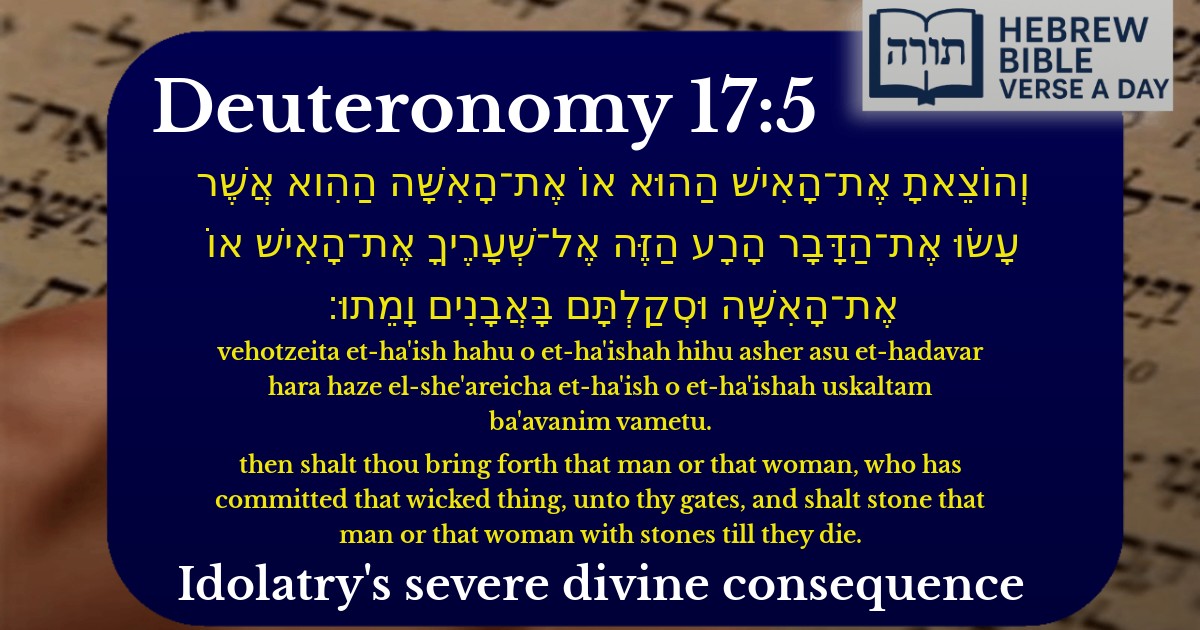Join Our Newsletter To Be Informed When New Videos Are Posted
Join the thousands of fellow Studends who rely on our videos to learn how to read the bible in Hebrew for free!
Hebrew Text
וְהוֹצֵאתָ אֶת־הָאִישׁ הַהוּא אוֹ אֶת־הָאִשָּׁה הַהִוא אֲשֶׁר עָשׂוּ אֶת־הַדָּבָר הָרָע הַזֶּה אֶל־שְׁעָרֶיךָ אֶת־הָאִישׁ אוֹ אֶת־הָאִשָּׁה וּסְקַלְתָּם בָּאֲבָנִים וָמֵתוּ׃
English Translation
then shalt thou bring forth that man or that woman, who has committed that wicked thing, unto thy gates, and shalt stone that man or that woman with stones till they die.
Transliteration
Vehotzeita et-ha'ish hahu o et-ha'ishah hihu asher asu et-hadavar hara haze el-she'areicha et-ha'ish o et-ha'ishah uskaltam ba'avanim vametu.
Hebrew Leining Text
וְהֽוֹצֵאתָ֣ אֶת־הָאִ֣ישׁ הַה֡וּא אוֹ֩ אֶת־הָאִשָּׁ֨ה הַהִ֜וא אֲשֶׁ֣ר עָ֠שׂ֠וּ אֶת־הַדָּבָ֨ר הָרָ֤ע הַזֶּה֙ אֶל־שְׁעָרֶ֔יךָ אֶת־הָאִ֕ישׁ א֖וֹ אֶת־הָאִשָּׁ֑ה וּסְקַלְתָּ֥ם בָּאֲבָנִ֖ים וָמֵֽתוּ׃
וְהֽוֹצֵאתָ֣ אֶת־הָאִ֣ישׁ הַה֡וּא אוֹ֩ אֶת־הָאִשָּׁ֨ה הַהִ֜וא אֲשֶׁ֣ר עָ֠שׂ֠וּ אֶת־הַדָּבָ֨ר הָרָ֤ע הַזֶּה֙ אֶל־שְׁעָרֶ֔יךָ אֶת־הָאִ֕ישׁ א֖וֹ אֶת־הָאִשָּׁ֑ה וּסְקַלְתָּ֥ם בָּאֲבָנִ֖ים וָמֵֽתוּ׃
🎵 Listen to leining
Parasha Commentary
📚 Talmud Citations
This verse is quoted in the Talmud.
📖 Sanhedrin 45b
The verse is discussed in the context of the laws of stoning, particularly regarding the requirement to bring the condemned individual to the gates of the city for execution.
📖 Sotah 8b
The verse is referenced in a discussion about the procedures for executing those guilty of certain sins, emphasizing the public nature of the punishment.


Context and Source
The verse (Devarim 17:5) discusses the punishment of stoning (skilah) for certain severe transgressions, particularly idolatry, as part of the broader legal framework in Parashat Shoftim. This is one of the four capital punishments administered by the Sanhedrin (Mishnah Sanhedrin 7:1). The Torah emphasizes that the execution must take place "at your gates"—a public setting—to serve as a deterrent and uphold communal sanctity.
Interpretation of "At Your Gates"
Rashi (Devarim 17:5) explains that "at your gates" refers to the city's courthouse (beit din), where trials were conducted. The Rambam (Hilchot Sanhedrin 14:1) elaborates that executions were performed outside the city to maintain its purity, as the verse states, "You shall burn the evil from your midst" (Devarim 17:7). The public nature of the punishment reinforces the severity of the sin and its consequences.
Gender Inclusivity in the Verse
The Torah explicitly mentions "that man or that woman", emphasizing that the law applies equally to both genders. The Talmud (Sanhedrin 66b) notes that women were subject to the same judicial process as men in capital cases. This reflects the Torah’s principle of impartial justice, as stated in Vayikra 24:22: "You shall have one manner of law."
The Severity of Idolatry
The "wicked thing" (דבר הרע) in this context refers primarily to idolatry (avodah zarah), as discussed in the preceding verses (Devarim 17:2-4). The Rambam (Hilchot Avodah Zarah 3:1) explains that idolatry undermines the foundation of Torah and the covenant with Hashem, warranting the strictest penalty. The Midrash (Sifrei Devarim 149) compares idolatry to a rebellion against the King, justifying its severe punishment.
Procedure of Stoning
Moral and Ethical Lessons
While the punishment is severe, the Torah’s emphasis on due process (Devarim 17:4—"you shall inquire diligently") teaches that justice must never be rash. The Talmud (Makkot 7a) states that a Sanhedrin that executed once in seventy years was called "destructive," highlighting the rarity of such punishments. The deeper message is the sanctity of monotheism and the need to eradicate spiritual corruption from the community.